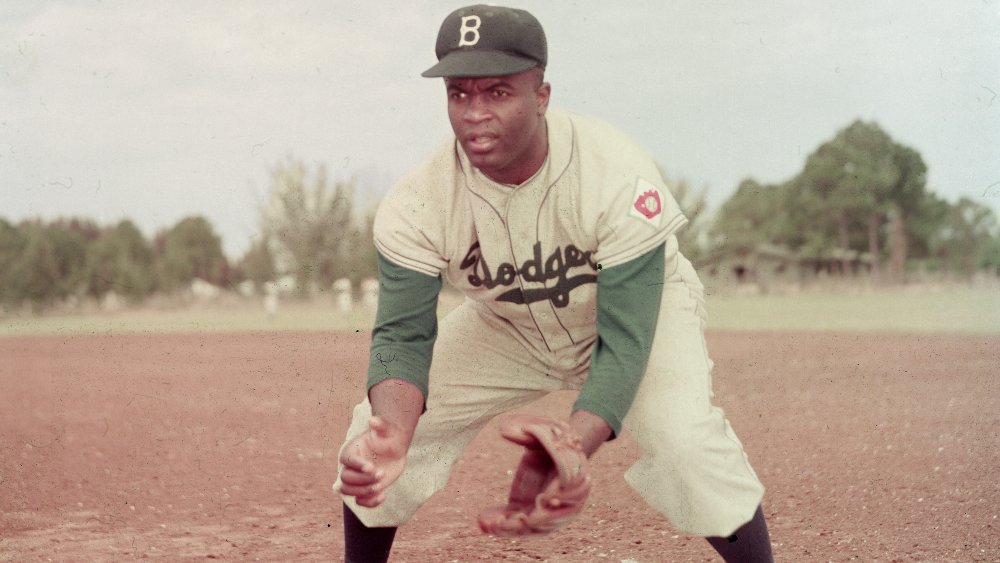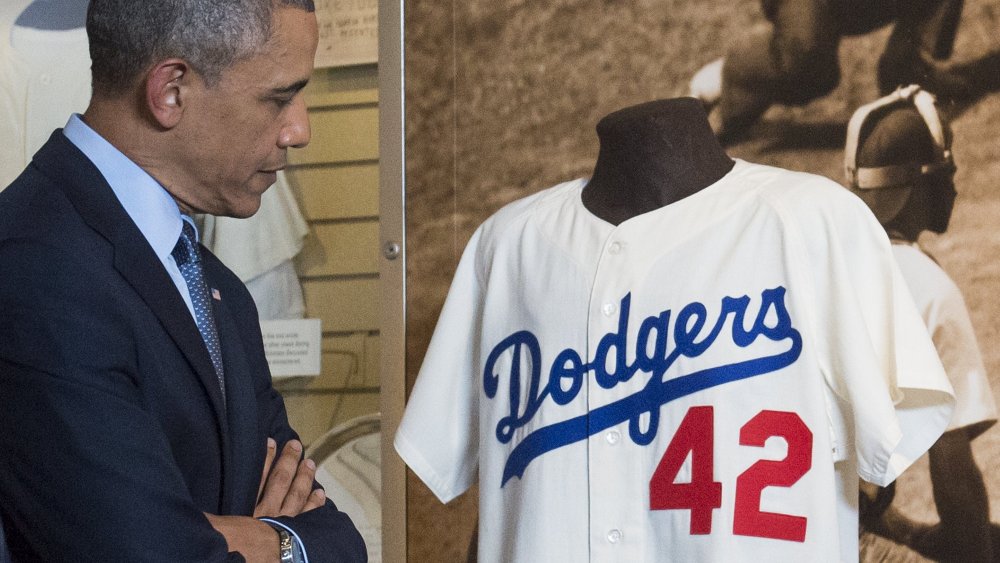The Real Reason Jackie Robinson Retired From Baseball
Author Rick Swaine writes that by Hall of Fame standards, Jackie Robinson didn't exactly knock it out of the park with regard to cumulative statistics — but mostly because he didn't play his first major league game until age 28, leaving him only 10 years to rack up stats. He was a solid hitter, excelled at stealing bases, bunting and seldom struck out — but the true measure of his greatness went beyond a baseball striking a bat. As Robinson would say, via the National Baseball Hall of Fame, "A life is not important except in the impact it has on other lives." When he made his Major League Baseball debut in 1947, became the first black player to do so, changing the face of baseball forever.
Robinson also became the first black MLB MVP, the first black Rookie of the Year, Hall of Famer, and the first baseball player of any race to feature on a U.S. postage stamp. He forged a path for future nonwhite players. In these respects, says Swaine, "Jackie Robinson is perhaps the most historically significant baseball player ever, ranking with Babe Ruth in terms of his impact on the national pastime."
Of course, lionizing a person runs the risk of mythologizing their life and legacy. And Robinson was lionized and tiger-ized. Swain observes that people characterized the iconic Dodger as "a tiger in the field and a lion at bat." And after the lion hung up his bat for good in 1957, all sorts of myths abounded about him and even how he retired.
A civil rights giant, but not a New York Giant
ESPN's Howard Bryant argues that Jackie Robinson became the star player in a game of historical revisionism that paints him as a saint who famously "broke the color barrier" in baseball. He calls it a fanciful "concoction" at best, asserting that many elements of the barrier would remain in place long after. "At worst," writes Bryant, "it is a simplistic and corrosive lie designed to keep America from itself." It robs Robinson of his humanity and whitewashes the uglier struggles of American history.
Robinson made mistakes, like anyone else. As the Society for American Baseball Research describes, during a frustrating game beset by heavy rain, Robinson got so angry with an ump's call that he flipped out and flipped his bat. That bat struck a married couple in the crowd who sued Robinson for $40,000. They settled out of court.
Even Robinson's retirement might be viewed through a distorted lens. The National Baseball Hall of Fame claims he walked away from the game after being traded from the Brooklyn Dodgers archrivals: the New York Giants. But writer Rick Swaine asserts that Robinson already intended to retire and had inked a deal with the coffee brand Chock Full o'Nuts, where he served as vice president. The Giants allegedly tried to change his mind with a $60,000 offer, but in a nutshell, he said no.
Robinson was thinking of his family legacy
It wasn't because he was tired of the game or unexcited to play with the Giants, where he would have shared the field with Hall of Famer Willie Mays. Bleacher Report notes that Robinson cited concern for his future, and for the security of his family, stating:
"At my age, a man doesn't have much future in baseball and very little security. After you've reached your peak, there's no sentiment in baseball. You start slipping, and pretty soon they're moving you around like a used car. You have no control over what happens to you. I don't want that."
Health may have also played a role in his decision — though Robinson would always claim he wasn't diagnosed with diabetes until after his retirement, Swaine cites evidence that Robinson became insulin-dependent mid-career. The disease would contribute to a decline in health that culminated in a fatal heart attack at the age of 53, just a few months after the Dodgers retired his jersey number, 42.


